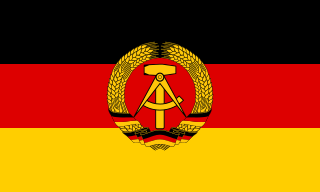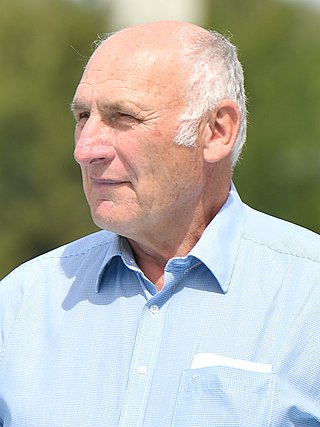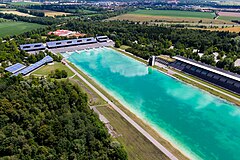
The 1972 Summer Olympics, officially known as the Games of the XX Olympiad and officially branded as Munich 1972, were an international multi-sport event held in Munich, West Germany, from 26 August to 11 September 1972. It was the second Summer Olympics to be held in Germany, after the 1936 Games in Berlin, which had taken place under the Nazi rule. Germany became only the second country at that point after the United States to have two different cities host the Summer Olympics.

New Zealand competed at the 1972 Summer Olympics in Munich, West Germany. For the first time at the Olympics, God Defend New Zealand was played instead of God Save the King/Queen. The New Zealand Olympic Committee was represented by 89 competitors, 82 men and 7 women, who took part in 63 events in 14 sports.

Athletes from East Germany competed at the 1972 Summer Olympics in Munich, West Germany. 297 competitors, 231 men and 66 women, took part in 161 events in 18 sports.
Timothy John Crooks is a former British rower who competed at the 1972 Summer Olympics and the 1976 Summer Olympics. He was seven times winner at Henley Royal Regatta and won the Wingfield Sculls three times.

The 1972 Olympic football tournament, held in Munich, Augsburg, Ingolstadt, Nuremberg, Passau, and Regensburg, was played as part of the 1972 Summer Olympics. The tournament features 16 men's national teams from five continental confederations. The 16 teams are drawn into four groups of four and each group plays a round-robin tournament. At the end of the group stage, the top two teams advanced to the second group stage, where the second-placed teams in each group advanced to the bronze medal match while the first-placed teams advanced to the gold medal match held at Olympiastadion on 10 September 1972. The medalists were Poland (gold), Hungary (silver), and shared bronze medalists East Germany and the Soviet Union, the first of three consecutive Olympic football tournaments where all the medalists were communist countries and the first since 1956.

The 1972 Summer Olympics were held in Munich, West Germany. 29 events in swimming were contested. There were a total of 532 participants from 52 countries competing.

Rowing at the 1976 Summer Olympics in Montreal featured races in 14 events, all held at the rowing basin on Notre Dame Island. Women's events held at 1000 m debuted.

Rowing at the 1964 Summer Olympics featured seven events, for men only.

Rowing at the 1960 Summer Olympics featured 7 events, for men only. The competitions were held from 30 August to 3 September on the Lago di Albano.

Rowing at the 1952 Summer Olympics featured seven events, for men only. The competitions were held from 20 to 23 July.

Hans-Johann Färber is a German rower who competed for West Germany in the 1968 Summer Olympics, 1972 Summer Olympics and in the 1976 Summer Olympics.

For the 1972 Summer Olympics, a total of thirty-two sports venues were used. A majority of the venues used were new construction in time for the 1972 Games after Munich was awarded the Games in 1966. Kiel Bay was the only venue from the 1936 Summer Olympics to be used for the 1972 Games. A stretch of the Autobahn near Munich was used for cycling's road team time trial event. After the Olympics, Olympiastadion hosted the final of the FIFA World Cup less than two years later. Augsburg's Eiskanal has served as host to three Canoe Slalom World Championships while the shooting range hosted the World Shooting Championships 2010. Olympiapark was part of Munich's bid for the 2018 Winter Olympics.

The men's single sculls competition at the 1972 Summer Olympics in Munich took place from 27 August to 2 September at the Olympic Reggatta Course in Oberschleißheim. There were 18 competitors from 18 nations, with each nation limited to a single boat in the event. The event was won by Yury Malyshev of the Soviet Union, the nation's fifth victory in the event; the Soviets returned to the top of the podium after having their four-Games (1952–1964) winning streak broken in 1968. Alberto Demiddi of Argentina took silver, the seventh man to win multiple medals in the single sculls. Wolfgang Güldenpfennig earned bronze, the first medal for East Germany as a separate team.

The men's coxed pair competition at the 1972 Summer Olympics in Munich took place from 27 August to 2 September at the Olympic Regatta Course in Oberschleißheim. There were 21 boats from 21 nations, with each nation limited to a single boat in the event. The event was won by East German crew Wolfgang Gunkel, Jörg Lucke, and coxswain Klaus-Dieter Neubert; it was the first medal in the event for East Germany as a separate nation. Czechoslovakia (silver) and Romania (bronze) also won their first medals in the men's coxed pair.

The men's coxed four competition at the 1972 Summer Olympics in Munich took place from 27 August to 2 September at the Olympic Reggatta Course in Oberschleißheim. There were 14 boats from 14 nations, with each nation limited to a single boat in the event. The event was won by West Germany; it was the nation's first medal as a separate team, but the third time in four Games that a West German crew had won gold. East Germany repeated as silver medallists, though with a new crew. Bronze went to Czechoslovakia, the nation's first medal in the men's coxed four since 1952.

The men's eight competition at the 1972 Summer Olympics in Munich took place from 27 August to 2 September at the Olympic Reggatta Course in Oberschleißheim. There were 15 boats from 15 nations, with each nation limited to a single boat in the event. The event was won by New Zealand, the nation's first medal in the men's eight. Silver went to the United States. East Germany also earned its first medal in the event, with bronze.
Christof Kreuziger is a German rower. He won gold medals for East Germany at the 1973 European Rowing Championships and the 1974 World Rowing Championships in double scull, and at the 1975 World Rowing Championships in quad scull.

The 1972 New Zealand eight was a team of Olympic gold medallists in rowing from New Zealand, having previously won the 1971 European Rowing Championships. At the time, the eight was regarded as the blue ribbon class of rowing, and the sport still had amateur-status in New Zealand, unlike many other nations competing in rowing. After a disappointing Olympic performance at the 1968 Summer Olympics by the New Zealand eight, national selectors Rusty Robertson, Don Rowlands, and Fred Strachan were tasked with assembling a new crew. Robertson was also the team's coach. The next time a New Zealand eight competed was at the 1970 World Rowing Championships, where they came third. The team was once again significantly changed for the next rowing season, with the 1971 edition of the European Rowing Championships and other international regattas beforehand seen as the ultimate test for the 1972 Summer Olympics. The team put up an impressive performance, beat the highly favoured East German eight, and became European champion; at the time the win was regarded as holding world championship status. No further changes were made to the team, not even their seating position, for the 1972 season. Despite a shoe-string budget, financial constraints, and all rowers working part-time, the 1971 success was repeated and the team won Olympic gold in Munich. The president of the International Olympic Committee (IOC), Avery Brundage, was a zealous advocate of amateurism; he was so impressed by the New Zealand performance that he insisted on handing out the gold medals himself. During the medal ceremony, much to almost everybody's surprise, "God Defend New Zealand" was played instead of the national anthem, "God Save the Queen". It was the impetus for a campaign to make "God Defend New Zealand" the New Zealand anthem, and in 1977 it was gazetted as having equal status to the traditional anthem.











